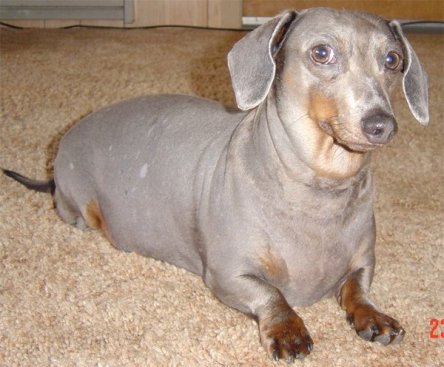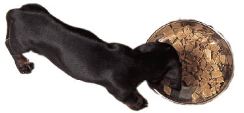
Not human bean, more than a human been!
 Food & Recipes
Food & Recipes
Dachshunds love to eat, and they have a knack for begging treats or extra food out of their owners. It’s important that you establish and maintain a nutritious and high-quality diet for your dachshund. Feeding your dog properly will prevent premature aging, coat problems, and serious health issues.
Some puppy foods can push puppies to grow too fast, and rapid growth can lead to tissue and bone abnormalities. Even hip dysplasia can be affected by too-rapid of growth.
Using commercial dog food is the easiest way to feed your dachshund—just open the package and pour it into the bowl.
Dog foods in addition to protein, fats and carbohydrates also must contain vitamin and mineral supplements in balanced concentrations. Too much of one mineral may interfere with absorption of another; too little of a mineral may interfere with vitamin use or other mineral use. Major dog food companies make every effort to provide balanced proportions of vitamins and minerals for maximum benefit to the dog
 Food and
Yummy Treats for Dachshund
Food and
Yummy Treats for Dachshund

Many nutritionists and veterinarians feel that a dog being fed a balanced diet that meets its requirement for nutrients does not need any supplements of vitamins or minerals. Some go so far as to say that supplements can unbalance the diet by disrupting the necessary relationship between vitamins and minerals. Some breeders disagree and regularly supplement their dogs with one of a variety of products promoted for healthy coats and skin, bone growth, reproductive capacity, etc.
There are three main types of dog food: dry, semi-moist, and canned.
- Dry food: Dry food, or kibble, is less expensive than semi-moist and canned foods of equal quality. Dogs who eat kibble usually have cleaner teeth than dogs who eat wet food because the dry bits scrape tartar from the teeth during chewing.
- Semi-moist food: Semi-moist dog foods are essentially soft, kibble-like chunks. They tend to stick to the teeth, harboring bacteria that cause gum disease, and most of them contain dyes and chemical preservatives that your dog just doesn’t need.
- Canned food: Canned foods may be recommended for a dog with dental or medical problems or for a dog whose appetite is poor due to illness or old age. Canned food is usually more expensive than dry food and must be refrigerated once opened.
The number of commercial dog foods on the market is staggering. When choosing a food for your dachshund, always read the package carefully, including the ingredients, and consider the following factors:
- Meats vs. meat by-products: Buy only brands that use meat, as opposed to meat by-products. The first ingredient on the ingredient list should be a specific meat, such as lamb, beef, or chicken.
- Formula: There are specially formulated foods that are tailored to the needs of dogs of certain ages or activity levels. For example, you can find puppy formulas, active dog formulas, less active dog formulas, and senior formulas.
- Premium vs. generic: Premium brand dog foods are more expensive than generic brands but also usually use higher-quality ingredients that are healthier and easier to digest.
- Preservatives: Avoid foods that contain artificial preservatives, which can cause health problems. These preservatives include ethoxyquin, butylated hydroxytoluene (BHT), and butylated hydroxyanisole (BHA). Natural preservatives such as tocopherols (vitamin E) and ascorbic acid (vitamin C) are safer.
Some owners who have dogs with dry skin may add a teaspoon or tablespoon
of corn oil to their pet's dinner, but many nutritionists think that
this adds only calories and that a food higher in essential fatty acids
will take care of the skin. Some owners purchase essential fatty acids
in a bottle and add that to the food.
Some owners think growing puppies need extra calcium and add it in the
form of bone meal. But this can do more harm than good, for calcium must
be in balance with phosphorus and magnesium in the diet, and an
overabundance of calcium can cause a myriad of problems.
Most dogs will do well when fed good quality dry dog food; occasionally
add some canned or frozen food, some meat broth (no salt added), or a
bit of liver for a treat; and avoid supplements unless recommended by a
veterinarian.
Those owners who would like to cook their own food at home should
contact a nutritionist for a recipe to make sure the ration is balanced.
Proponents of home-cooked diets claim that their dogs have more energy,
shed less, and are leaner. Home-cooked diets include mostly human-grade
foods, such as low-fat cuts of meat, deboned chicken, fish, fruits and
veggies, healthy grains, yogurt, and human-grade supplements.
Treats are an integral part of training and account for a great deal of pleasure in a dachshund’s life. Rather than use artificial “junk food” treats, look for natural and low-calorie treats in specialty pet stores, online retailers, or even in some big pet store chains. You also can provide carrots, green beans, or freeze-dried chicken as healthy rewards.
Tips
- Puppies 8 to 12 weeks old need four meals a day for optimum health and growth.
- Feed puppies 3 to 6 months old three meals a day.
- Feed puppies 6 months to 1 year 2 meals a day.
- When your dog reaches his first birthday, 1 meal a day is usually enough, although you can split the quantity you would feed, and make it into 2 meals
Puppies should be fed a high-quality, brand-name puppy food. Limit people food intake, because it results in vitamin and mineral imbalances, bone and teeth problems and may cause bad eating habits and fat dogs. Clean, fresh water should be available at all times, and be sure to wash food and water dishes often.
As you dog becomes a senior citizen his nutritional requirements may change. As he gets older he will naturally be less active than he was as puppy and young adult and therefore may need less energy from his diet. A special diet is sometimes needed for him as he grows elderly. Adjustment in the content of protein he gets might be needed as organs can become less efficient in dealing with food. Many of the major brands of dog food have formulas available for the elderly dog.
Lots of people are making their own dog food and trying to feed dogs a more natural diet. One food that is good for puppies and adults alike is yogurt. It is an excellent source of lacto-bacillus which are essential for proper digestion and can be the difference between life and death for puppies receiving antibiotics or nursing from mothers being so treated.
If your dachshund refuses to eat the food you serve, try another type of food, but make the change gradually to avoid stomach upset.
If your dachshund seems to suffer from gas, intestinal problems, allergies such as itchiness or hair loss, or other health issues, discuss the problem with your vet, who may recommend a specially formulated food.
Obesity
Obesity in dogs is a serious medical problem. Fat dogs are more at risk in surgery, more prone to injury, and have more stress on their heart, lungs, liver, kidneys, and joints. Fat complicates diseases, injuries, and surgery and stresses the body. Health factors associated with obesity include skeletal stress, cardiopulmonary disease, interference with normal reproductive functions and puppy delivery, complications to diabetes, difficulty in regulating body temperature, and potential inflammation of the pancreas. Surgery takes longer if the veterinarian has to work his way through layers of fat, and obesity complicates drug therapy, anesthesia, and recovery from injury.
Change feeding habits: Switch your dachshund to a low-calorie or senior-formula food, and cut back on the amount you feed him at each meal. Also limit his treat intake.
Change exercise habits: Increase your dog’s daily walks by just a few minutes each day until he is getting 10 additional minutes of exercise a day.
Feeding your dog at scheduled mealtimes is the best way to control how much he eats, resulting in better weight control and allowing you to monitor his health. (Lack of appetite is often the first sign of illness.) Free feeding, a method in which food is left out all day, can wreak havoc on the digestive system and lead to obesity. The best feeding schedule for your dachshund depends on his age and lifestyle.
